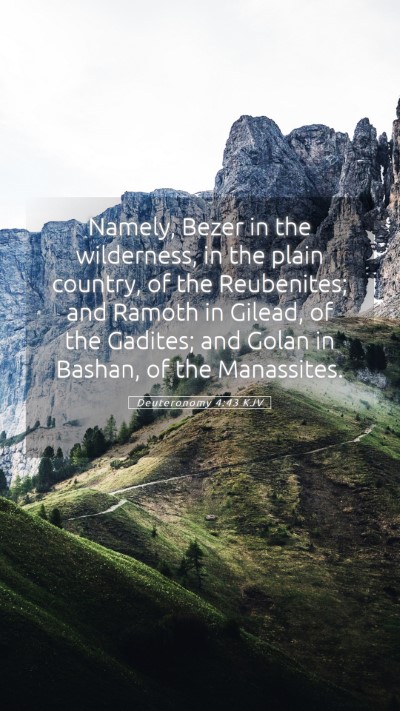Understanding Deuteronomy 4:43
Deuteronomy 4:43 states: “Namely, Bezer in the wilderness, and Ramoth in Gilead, and Golan in Bashan, which are cities of refuge.” This verse discusses cities of refuge designated for individuals who committed unintentional manslaughter. These cities provided asylum from avengers of blood, emphasizing God's mercy and protection for the innocent.
Bible Verse Meanings and Insights
This verse illustrates crucial themes of justice, mercy, and divine provision encapsulated in the concept of cities of refuge. The cities mentioned serve as a safe haven for those seeking refuge, underlining the importance of God's compassion and the organized system of justice in Hebrew society.
Commentary Summary
Various public domain commentaries provide rich insights into the significance of this verse:
-
Matthew Henry:
Henry emphasizes the character of God as a refuge and the moral law's acknowledgment of human fallibility. He notes that the establishment of cities of refuge indicates God's desire for justice tempered with mercy, allowing individuals to flee from the consequences of accidental actions.
-
Albert Barnes:
Barnes focuses on the geographical significance of the cited cities, as they were strategically located to serve the various tribal districts of Israel. He illustrates how the concept of refuge not only meets the immediate needs of the repentant but also reflects the broader theme of God providing protection during times of danger.
-
Adam Clarke:
Clarke provides an in-depth look at the historical context of the regions mentioned. He outlines how the boundaries of refuge cities were critical for ensuring accessibility, thus symbolizing God's willingness to provide refuge and safety to those in need. Ultimately, he relates this to the New Testament concept of Christ as the ultimate refuge for sinners.
Importance of Understanding Scripture
Grasping the meanings behind verses like Deuteronomy 4:43 is vital for anyone engaged in Bible study groups or online Bible study. Through scripture analysis, believers can see how divine principles of justice and mercy resonate throughout the Bible, providing guidance not just for the ancient Israelites but for modern-day believers as well.
Cross References
This understanding can be enriched by considering related Bible verses, including:
- Exodus 21:13 - Discusses the establishment of cities of refuge.
- Numbers 35:11-15 - Describes the cities of refuge and their purpose.
- Joshua 20:2-6 - Outlines the cities of refuge appointed by Joshua.
Application of the Verse
In applying Deuteronomy 4:43 to daily life, one might reflect on the importance of seeking refuge and mercy in times of guilt or struggle. The verse challenges individuals to recognize their own fallibility and the grace extended to them, fostering a thoughtful approach in their interactions with others.
Conclusion
The exploration of Deuteronomy 4:43 through these commentaries reveals deep truths about the interaction between divine justice and mercy. Understanding these elements can significantly enhance Bible verse interpretations within study groups, enriching the community’s learning and spiritual growth.
Bible Study Insights
For those dedicated to exploring the meanings of Bible verses further, utilizing Bible study tools and Bible study resources can greatly aid in uncovering the complexities within scripture passages. As individuals delve into these insights, they cultivate a deeper appreciation for biblical narratives and their implications for personal faith.
Final Thoughts
Ultimately, the narrative within Deuteronomy 4:43 offers a reminder of God’s protective nature and the importance of justice and mercy in human relationships. By engaging thoughtfully with scripture, individuals can navigate the complexities of their own lives, finding solace in the refuge that faith provides.


